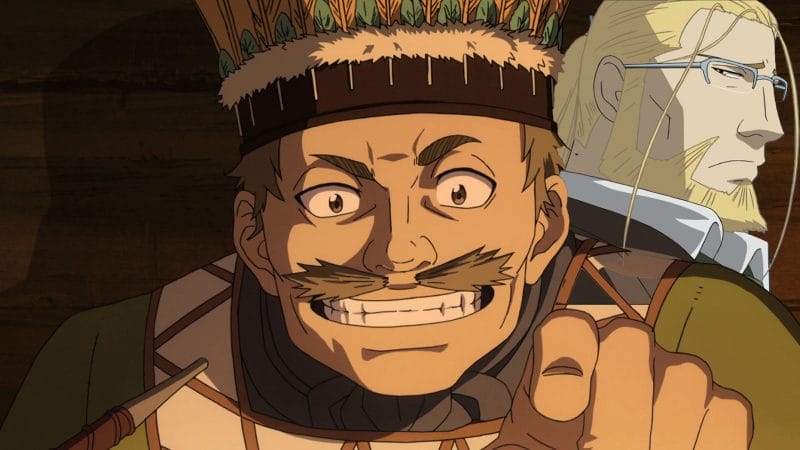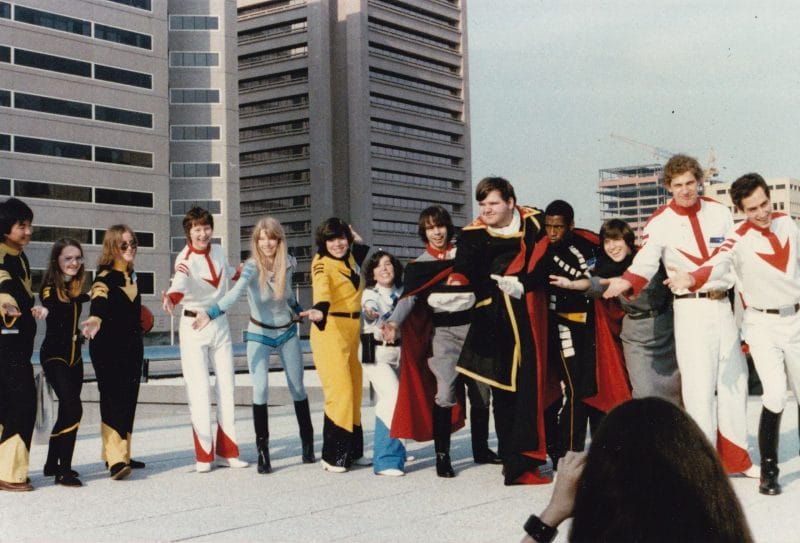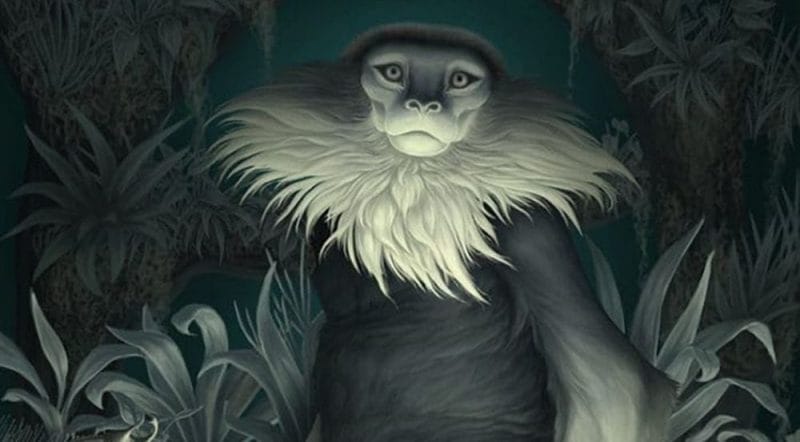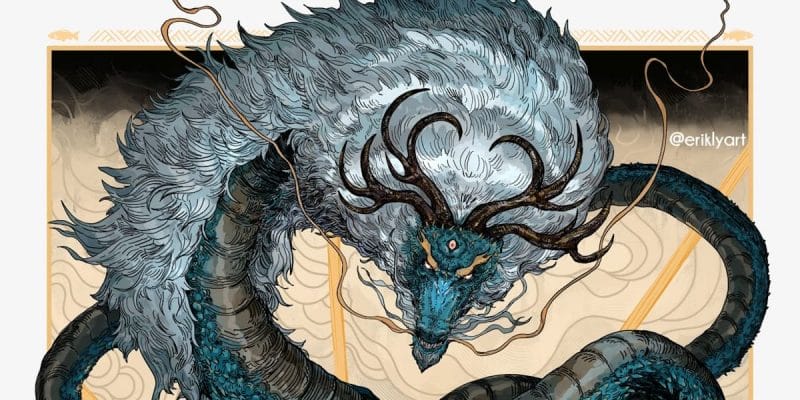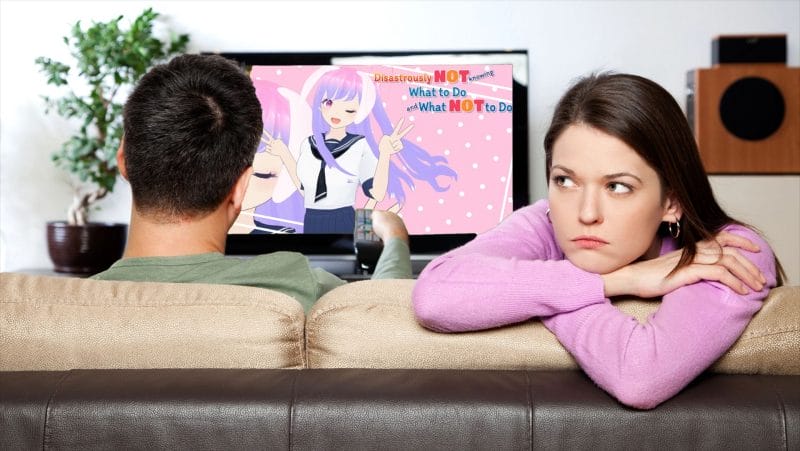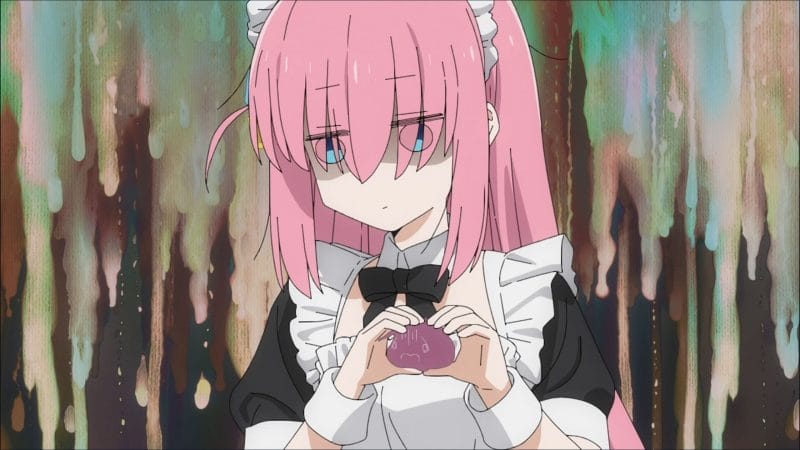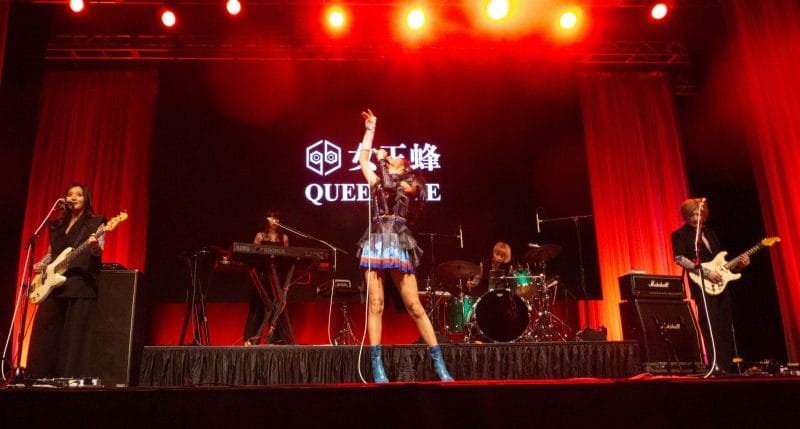Interview With Paranom and Aztech
Location: Anime Boston 2023
Interview Date: 4/8/2023
Editor: Samantha Ferreira
Anime Herald: What is your origin story? How did you get from where you started to here?
Aztech: As far as music goes?
Anime Herald: Yeah. Whatever inspired you. Whatever risks you took to start your career.
Aztech: I grew up mainly in the north shore of Massachusetts. I spent some time in South Korea, which is where my family is from. I started pursuing music in 1997. I was influenced by the hip-hop that was out around that time, among other things. Martial arts was my first passion, which turned into break dancing, which turned into making hip-hop.
I didn’t put out my first record until 2001. I pursued it full-time, but I was young, so obviously it wasn’t realistically full-time. It was trying to make music, put it out, and do this, that, and the other. It wasn’t until about 2005 that I started recording in a real studio and making music to put out to the masses. Ran through the local hip-hop scene in Massachusetts for quite a while.
Fast forward to 2014, linked up with a producer from Japan who had just moved here to be at Berklee (College of Music). He joined me with a group that he already had going since the late ‘90s. We started pushing our music on Japan a little more. We put a record out in Japan, which charted. It ended up with Toho Animation contacting us to do one hip-hop song for a show called Blood Blockade Battlefront. It went really well. From then on, whenever they needed hip-hop, they called us. Hence, where we are now.

Paranom: I’m of Haitian descent. I’m heavily influenced by that culture at home. My family, as well. My family is full of singers. I started being involved in music since I was three. I started singing during that time. My mom had a youth choir. She put me in the youth choir. I used to do solos during that time. Around five or six that used to happen often, at the church. I always had music around me.
Hip-hop became more of a staple in my life at around seven or eight, when I wasn’t guarded so much by my mom. When I was eight or nine, I remember hearing, on the underground radio station at night, a specific song that was so different than anything I’d ever heard until then. It inspired me to start writing music.
My brother and older cousin were also both into music and hip-hop. They inspired me as well. We had a little crew, a whole bunch of us at different ages, growing up together inland. Expanding our reach in the street, things that we liked, video games, anime.
Around thirteen or fourteen, we had a few family issues, so I moved down South to Alabama for high school. It was the difference between day and night. I was one of the only black kids in my high school. It was tough, for a little bit. But, I was someone who was always kind of talented, so in that respect, I was kind of respected. But, still, behind my back, it wasn’t so clear sometimes.
Me, wanting to express myself, I turned to music a lot. I started recording by myself because no one else was around to teach me how to do it. I learned how to record myself when I was fourteen. I started getting heavier into it. I made my first album when I was fifteen. I burned CDs and sold them in school. I sold a whole bunch of those. That was my freshman year. The year after that I did my second one. I kind of got better and better. I was super into it, sports and music.
I sold my second CD in school. I kept on learning my craft. Around senior year, I wanted to move back. My cousin died when I was seventeen, in a car accident. That changed my life. I moved back right after graduating high school.
That was one of the reasons I applied to Berklee. My older sister encouraged me to apply. I got accepted for rapping. This was around 2006. I tried to go there. I didn’t have enough money. They recommended I go to community college and then go back. I tried that. I went to RCC for a year and a half. I still couldn’t get to Berklee because of money. I fell back on something I was interested in in high school, poli-sci. I went to Emmanuel College for that. It didn’t really work out.
During that time what I was learning in school wasn’t really what I wanted anymore. I went more into rap. Flunked out of school. Recorded more, made more music, performed more, got pretty well-known out here.
Almost every year, or every year and a half, I would do a new project. I would just get better and better. Around 2012 was when I was first kind of seen as pretty dope for an album I made. The year after that, I got a distribution deal through one of my homies, who was in a collective I’m a part of, Tragic Allies, also from Lynn.
It’s a roundabout story because one of my homies in that group was good friends with my cousin who passed away, so it’s a tie that’s deeper than rap. He got a distribution deal, and he passed it down as he had success. We had success during that time and toured Europe in 2014. We toured with Killah Priest. We played Germany, Austria, and Greece, which was cool.
Coming back here, it was interesting. Experiencing the life out there, we got flown out, we got paid. Dope hotels. We were able to experience the life we had been working so hard for. Coming back home I had to realize, it wasn’t a long-term thing. It wasn’t sustainable. It was just an experience.
I felt the difference between somewhere where you feel different aspects of yourself, versus coming back to the hood, where there are parts of yourself that happen as a result of your environment. People around you are like that, so you feel like you have to be like that.
I had a couple of bad years, running around the street, doing music, being a part of the scene. He’s someone that was right there too, a part of it as well (Aztech). 2015 I started doing more music. Got a little bit bigger online. 2016, had a few issues. Certain relationships and friendships and things like that. I kind of took a backseat a little bit to focus on my life. Got into food and some different hobbies of mine.
During that time, once in a blue moon, I would come along to one of his sessions. I met Yuki (Kanesaka) through him, around 2014. I was invited to be a part of the Hybrid Thoughts album collective Yuki was a part of. That took off on its own.
As I’m focusing on myself, and still creating, but not being seen as much in the scene. Just because of egos around and stuff like that, I was still able to stay relevant. Still able to help bolster my career. Also, learning the business aspect of music as well, so when I do release my music, I have a strong foundation. A lot more knowledge, a lot more awareness about what I want to do, what I see as success for myself personally.
It’s great that we’re a part of this. And also, being anime fans as well. During that time, I’m watching a lot of anime.

Anime Herald: Let’s talk about that. What were the anime that got you into anime?
Aztech: For me personally, when I was living in South Korea I saw an anime called Madö King Granzört. I had an aunt out there who worked at a slap-on bracelet factory. A lot of them were anime-based. They were big, syndicated, and watched a lot in Asia, but not in America yet. This was back in 1993. It was a thing over here yet.
The first time I watched them over there, I noticed there was something obviously different about these cartoons as opposed to what I was watching at home. I got really into them, but I couldn’t find them anywhere. All I had to show for them was the slap-on bracelets, so I kept showing them to my friends “This is what I watched in South Korea. You should look into it.”
Fast forward a few years, one of the shows I watched there, Dragon Ball, ended up being shown in America. From that came Pokémon. Anime started becoming a regular big thing here. I got a little bit of a sneak peek early on.
The music was something I always really enjoyed about that. I felt that the music was a big part of anime. And music kind of raised me anyways. My mother was a single immigrant mother. I didn’t really have too many things to be inspired by. We were just focused on surviving. So, the music in anime, which was always so inspirational and epic, the battle scenes, the music was such a big part of that.
It sounds almost like a cliché to say, but it really is a dream come true that we’re doing this. Just because of how I used to look at the music in these, and now we’re making it. I always credit Madö King Granzört anime as the first one I watched. It was just different than anything I had ever seen.
Then, you started to see the influence. I remember when Power Rangers came out here, I remember seeing the way it looked and thinking “That looks exactly like that show I watched in Korea, in 1999, two years before that.”
Paranom: For me, my first one is Yoroiden Samurai Troopers, which over here is known as Ronin Warriors. That’s the earliest one I remember seeing in 1994 or 1995. I remember walking home from school. We didn’t live too far away. We were kind of young to be walking too, me and my younger sister, we were seven and six. I remember coming home from school every day, we’d have food waiting for us, and then we’d watch Ronin Warriors.
A few years after that it became Ronin Warriors and Sailor Moon back-to-back. We’d watch both of them together. That was my introduction to anime. As far as latching on, when Dragon Ball came out. That’s when I really latched on, in 1997 or 1998.
I was a big cartoon kid. I loved Batman a lot. Just seeing the spectacle. Fighting shows, period. Power Rangers was great. I didn’t realize at the time that Power Rangers could be put in the same vein since it came from Super Sentai. I didn’t understand that until way later, after watching Super Sentai.
Dragon Ball was huge. I remember I used to record on cassettes and archive things. That was the culture at the time. I used to record Dragon Ball Z episodes on VHS. This was during the horrible dub days, “dub-isms” and all that stuff. Being a kid and being so enthralled in it, and watching every episode. You think you know every aspect of it. “Yo, I’ve watched every episode!”, but you’ve only watched an eighth of it. During that time, you’d get to a certain point, and then start over again, because they only dubbed to a certain point, because they only licensed that number of episodes.
This went on for several years. The whole of Dragon Ball Z wasn’t shown in America for quite some time. I remember four or five years after I originally watched it on TV, I learned about importing. Back in the day I went to a store and saw they had Dragon Ball Z import tapes. By this time Dragon Ball Z had been finished for years, but hasn’t been out in full over here. I remember buying it and being “What is this?” It blew my mind.
I was also big into computers as well. I was super outside, and also inside. I was making my own websites. I was a part of the online Dragon Ball Z community. It was kind of the same way like it was with music. I got inspired so much, I just got better and better, because I stuck with it. I got better at making websites. Just being a part of it, the Dragon Ball Z culture.
After that, getting older and getting into different anime. I had friends who were involved in well, so they’d put me onto some, especially the older ones. I would be more curious, choosing something blind, to watch. The Blockbuster days. Before we could each choose a movie, we could choose only one. We used to fight all the time. I remember that stuff.
In high school, I used to go on eBay and buy burned copies of different anime so I could watch it in full. I remember getting the whole Dragon Ball series that way. YuYu Hakusho. Dragon Ball Z was the quintessential anime that got me to latch on. Story-wise, I think there are many that are better, but as far as my favorite one that made the biggest impact, I’d definitely say Dragon Ball.
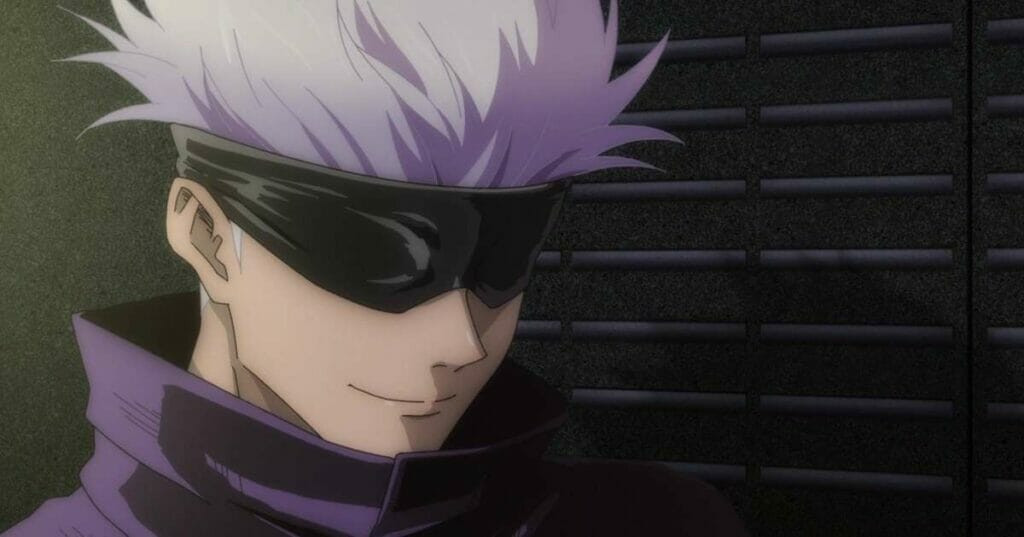
Anime Herald: It’s amazing how much we connect to this stuff. I hear Dragon Ball Z so often.
Let’s talk about your big break. How did you decide to release the album in Japan in the first place?
Aztech: The producer I was talking about before, Yuki Kanesaka, he’s from Japan originally. The original group when I created Hybrid Thoughts was a completely different group than it was during this time. I had tried different avenues, different crews. I tried doing my own thing for a while. Around that time I was talking with a few of the original members. It didn’t really work out, but I had already pushed this name so hard for so long. I had it tattooed on me and everything. I couldn’t let go of it, you know.
I met Yuki through my wife. She wasn’t my wife at the time, but she is now. Yuki’s wife was modeling for my wife. My wife is a designer. She was modeling for my wife and they were doing a fashion show, which she asked me to perform at. Yuki was handling the sound. He loved the way I performed, my energy, and all that. He asked me to collaborate with him on an album he was putting out in Japan. He had already been signed to a label in Japan at the time.
I featured on his album. The song I did with him worked so perfectly. Almost too perfectly, to the point where it was a “What took me so long to find you” kind of thing. It sounded so good, I was like “You know what, I’m trying really hard to bring this group back, why don’t you come along, produce everything?”
He called two days later and already had six beats made for us. I kind of started linking up with the people I had around at the time. Hybrid Thoughts was always the people I had around me, the people who matched the vibe I had. Paranom was already a friend of mine. I had called him to come in and do a song or two.
About halfway, maybe three-quarters of the way, through finishing the album, I was talking with Yuki. He had more experience in terms of dealing with record labels and the industry. He originally wanted to put it out on an American label. It was kind of his dream to put a record out on an American hip-hop label.
At that time, 2015, 2016, America wasn’t keen on signing 90’s style hip-hop. I was trying to explain that to him. We’d have very limited options over here, and it would be hard to get one of those limited options to latch on to us if they don’t know who we are. We had one big feature on it, KRS-One, which was really big. They used that to promote it, but I was like “Why don’t you try to pitch this to one of the labels you’ve already worked with in Japan.” He said, “I’ll try.” He pitched it and called me a day later saying “They absolutely love what we have so far, so let’s finish it and put it out through them.”
That was my first experience putting something out on a real label. I’d worked with some independent labels prior to that. That was my first time working with a real label like that, with a real push, putting us out on billboards in Tokyo and everything. That was something I’d never experienced.
It finally got released in April 2017. It ended up charting over there. It did better than anything I’d ever done prior to that. At that point, I’d already been making music in America for seventeen, eighteen years, and nothing ever came close to that. Two days after it was released, we got the report from Tower Records in Tokyo. We had outsold two hip-hop albums that were giant in America, one being Kendrick Lamar, the other being Run the Jewels. It was only one day, but we outsold them both for a day. I was like, “This is literally unfathomable.”
Mind you, I’m still here, being myself. I walk down the street, no one knows who I am. Next thing, he sends me a picture of Tower Records in Tokyo. As soon as you walk in the entrance there’s a giant billboard that says Hybrid Thoughts and there’s a picture of all of us hanging up there. We just got this memory, six years ago to the day Itunes Japan had us on the front page. We thought “Clearly, Japan likes what we were doing.”
That album did well. I mean, it didn’t stay doing that crazy well the whole time. It did trickle down like everything does. But it did well enough to catch the ears of some execs at Toho Animation. They called us, myself and Paranom specifically, to do a song for Blood Blockade Battlefront. That was the first song we did on an anime soundtrack. Us, being the two members of the group being severely into anime already. I think Yuki knew that which is why it was specifically us he called us to do it. We did that and didn’t think anything further than “This is really cool.” It was a dream come true in general. We saw the show, the credits rolled, our names were on it. We thought “This is awesome.”
Fast forward, later in the same year, they call us “We want you to work on another one.” We go to a studio in Fenway called Mix One. We walk in there and there’s the entire production team for Toho Animation, here in Boston. “We’ve got another show for you guys.” It was based on a manga called Dr. Stone. We did five songs in about three hours for Dr. Stone, not knowing what it was about or anything.
I think that impressed the production team, that we did it so fast. Five songs in the span of a few hours. After that came Jujutsu Kaisen, and then the other seasons for Dr. Stone. It turned into, whenever they needed hip-hop, they now call us. Which in turn, as of 2020, made us the most featured hip-hop artists ever. We’ve been on more soundtracks than any hip-hop artist ever, which is crazy.

Anime Herald: You’ve also had pretty good luck with the shows that you’ve worked on being successful.
Aztech: I know! On the panel, I was like “It’s super lucky that we’ve done good shows and shows that have taken off.” Both times, specifically, Jujutsu Kaisen and Dr. Stone, when we did them, it was the first season. You can have an idea, but you don’t know how big they are going to get. Fast forward, they were two of the biggest shows of their years. It was kind of crazy.
Anime Herald: What was the underground radio station you were listening and what song caught your ear?
Paranom: The station was 88.9. Eighty-eight-nine at night. It’s not the same way as it was anymore. It was a huge staple. Even when I was listening to it, it was past its glory days. It’s been around for a long time. People older than me had even richer memories of it. It was nighttime. I think I was eight. The song was “Get Retarded” by Canibus. I remember that to this day. He’s a lyricist. He’s been a big artistic influence.
I felt like I got electrocuted. I was like “What is this, ahhhhh!” It changed my brain.
Anime Herald: Breakdancing, do you still got it?
Aztech: No. I try once in a while, but no. I wish. But that’s definitely what introduced me to hip-hop. I think that’s why I started living life the way I did, being so about hip-hop culture in general. I think starting with an element that’s not rapping kind of forces you to look at hip-hop as a culture in a different way. The origins of it and why it was created, and the purpose it was created for.
I think that’s why I’ve carried that around so much, to the point where it’s sort of pigeon-holed me at some points. I felt I was a little too preachy at some times, telling people what is real hip-hop and what’s not. I’ve grown out of that, but I was definitely a victim of that for quite a while. I think starting with break dancing was the main reason for that.
Anime Herald: What anime or manga do you think are fire these days?
Paranom: I just finished watching the second season of To Your Eternity. It was really cool. Right now I’m watching Vinland Saga. I just finished the third season of My Hero Academia, which was amazing. Link Click. It’s super cool. It’s a Chinese production. There’s a Japanese dub, but it’s originally Chinese.
Ones I’m looking forward to: Demon Slayer. Definitely looking forward to that one coming back. My Hero Academia, of course. Thunderbolt Fantasy.
Anime Herald: Murder puppets.
Paranom: For me, that one’s the pinnacle. I remember watching it and being blown away. I can’t wait for that to come back. Super dope. I just finished Dragon Quest. Super cool. Great adventure story, which ended beautifully.
I’m always rewatching different ones. Dragon Ball, Dragon Ball Z. Jojo’s Bizarre Adventure, Hunter x Hunter, Fullmetal Alchemist: Brotherhood.
Aztech: Aside from the ones that we work on, which we really do watch, Cyberpunk Edgrunners was great. I enjoyed Blue Period. As an artist, to really connect with somebody like that, I thought was really cool. Hunter x Hunter. I also like to indulge in the lighthearted anime. Uncle From Another World, being that I’m an old gamer. Lookism was cool, being that I work in fashion as well.
I watch a lot of the more unknown ones, the underground ones. I think there’s a huge amount of gatekeeping in the anime community. They’ll tell you you’re not an anime fan if you’re watching Netflix anime. But, if you’re not watching those, you’re missing some great shows. Lookism, Uncle From Another World, Hi Score Girl was amazing, adorable. About a year ago, I went through the Netflix top ten for anime and they were all good.
Anime Herald: If you were going to teach a college course, what’s the knowledge you would like to pass on to the next generation?
Paranom: I did an anime workshop for a charter school in Cambridge. I did it on “The Hero’s Journey.” The hero’s journey is a motif that’s basically in every story. It reflects life in general. We have our regular day. We’re oblivious to what’s going on. Something occurs, and then we have a call to action, that gives us the impetus to do something. It can be “My mom is sick, I need money, I’ve got to go get money.”
You have your training arc, where you meet people on your journey. You have your battle, where you get tested. You have your breakthrough, where you can have your transformation. You get broken down, you make moves, and you transform to be able to beat it. Then you go home you start over again.
Statecraft, or nation building, legalese, are something I’ve been interested in for many years. I feel like us grasping the ways that words are used socially, as opposed to legally, would help us to be able to navigate the world, rather than being divided by pieces of paper.
Aztech: Actually, I used to teach a high school class. It was a music career class. I taught them how to read a contract properly, what to do with your music after you make it. I’d love to carry that on. As for something else in general, I would love the both of us to teach a class together. Maybe the intersection of black and Asian culture. I feel we’re two cultures that share so much in terms of a similar struggle, in different aspects of course. I feel like there’s a huge divide within the two cultures, that neither side is acknowledging. There are so many similarities we share. I feel that would be a beneficial course.
Anime Herald: Thank you very much, this was great.
Aztech: Thank you.
Paranom: Those were great questions. I’m glad you like Thunderbolt Fantasy. Amazing, amazing show.




